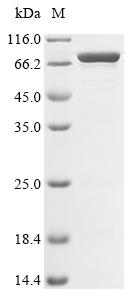Recombinant Escherichia coli Colicin-E7 (colE7) is expressed in an E. coli system, covering the complete protein sequence from amino acids 1 to 576. The protein carries a C-terminal 6xHis-tag, which makes purification and detection more straightforward. Purity exceeds 85% based on SDS-PAGE analysis, which appears sufficient for most research applications. This product is meant for research use only and should not be used for diagnostic or therapeutic purposes.
Colicin-E7 is a bacteriocin that E. coli produces, and it's well-known for its role in how bacteria compete with each other. The protein works by creating channels in target bacterial membranes, ultimately killing the cells. Scientists often study Colicin-E7 to understand how it works and explore whether it might help control bacterial populations. This makes it quite useful for microbiological and biochemical research.
Potential Applications
Note: The applications listed below are based on what we know about this protein's biological functions, published research, and experience from experts in the field. However, we haven't fully tested all of these applications ourselves yet. We'd recommend running some preliminary tests first to make sure they work for your specific research goals.
Based on the provided information, the recombinant Escherichia coli Colicin-E7 is expressed in E. coli, which is a homologous expression system since Colicin-E7 is naturally produced by E. coli. This increases the probability of correct folding, as the host system is well-suited for producing bacterial proteins with minimal issues related to post-translational modifications or folding machinery. The protein is full-length (1-576aa) and includes all functional domains, further supporting the likelihood of proper folding. However, since the activity is explicitly unverified, it cannot be guaranteed to be correctly folded or bioactive without experimental validation (e.g., nuclease activity assay for Colicin-E7). The C-terminal 6xHis tag may potentially interfere with function but is unlikely to prevent folding. Thus, while the protein has a high chance of being functional, confirmation is needed.
1. Protein-Protein Interaction Studies Using His-Tag Affinity Purification
The C-terminal 6xHis tag allows for nickel-affinity-based pull-down experiments to identify binding partners. If the protein is correctly folded, this application is valid for studying interactions with host factors or regulatory proteins. However, if misfolded, interactions may be non-physiological, leading to false positives or negatives. Researchers should first validate folding through activity assays before interpreting results.
2. Antibody Development and Immunoassay Applications
This recombinant Colicin-E7 is suitable as an immunogen for antibody production, as antibodies can recognize linear epitopes even if the protein is misfolded. The >85% purity is adequate for immunization, and the His-tag facilitates assay development. However, if misfolded, antibodies may not recognize the native protein in physiological contexts, so validation against functional Colicin-E7 is recommended.
3. Biochemical Characterization and Stability Studies
This application is appropriate and should be prioritized to assess protein folding. Techniques like thermal stability profiling or pH tolerance testing can provide insights into folding quality. The full-length protein ensures all domains are present for characterization. Even if misfolded, these studies are valuable for understanding the recombinant product's properties.
4. Comparative Structural and Functional Analysis
The recombinant protein can be used for comparative studies with other colicins, but if correctly folded. If misfolded, comparisons of structure-function relationships may be invalid. Limited proteolysis or binding assays should be conducted only after confirming folding through activity tests.
Final Recommendation & Action Plan
Given the high probability of correct folding due to homologous expression, it is essential to first validate the protein's bioactivity through functional assays (e.g., nuclease activity test for Colicin-E7) and biophysical characterization (e.g., size-exclusion chromatography). If active, the protein can be reliably used for all described applications; if inactive, focus on non-functional uses like antibody development or biochemical characterization. Always include controls such as native colicins for comparative studies, and optimize conditions if folding issues are detected.






